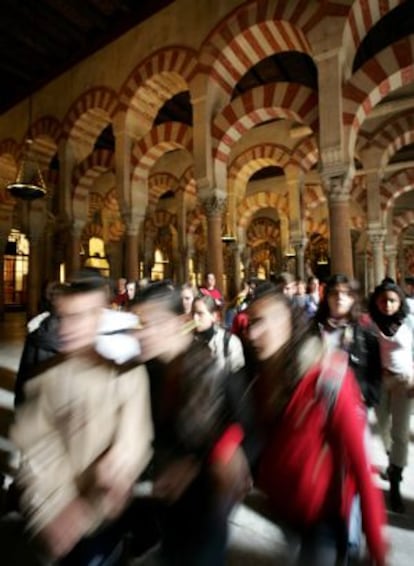A legal tug-of-war over the ownership of Córdoba’s Mezquita Cathedral
State Heritage Office dismisses claim that Church “usurped” historic building It was purchased for just €30 by the bishopric, which wants to wipe out traces of Islamic past

Córdoba’s Mezquita cathedral has become one of the most visible symbols of the battle that citizen groups are waging against the privileges of the Catholic Church. And the Spanish government has just positioned itself on the side of the latter in this particular fight.
The Mezquita is one of the world’s most stunning examples of Moorish architecture. It was built as a mosque in 987, but was converted into a Catholic cathedral in 1236. With its mixture of columns, arches and chapels, it remains one of the Andalusian city’s biggest tourist attractions, and reflects Spain’s Christian and Islamic past. But a legal tug-of-war has now emerged over its ownership.
Spain’s Franco-era Mortgage Law, which was passed in 1946, has allowed the Church to register thousands of properties in its name via a simple process that a number of law experts say is unconstitutional. In 1998 the conservative Popular Party government of José María Aznar extended this privilege to also include places of worship. Since then thousands of properties of all types – cemeteries, smallholdings, chapels and cathedrals – have passed into its hands. In the Navarre region alone, the Church has registered 1,087 properties using the formula, including a cathedral. One estimate made by EL PAÍS a year ago with the help of sources close to the Land Registry talked of around 4,500 properties across Spain,
The Bishopric of Córdoba registered the Mezquita in 2006 for just €30. At the end of 2013 a group of citizens created a platform to demand that the ownership and management of the monument be passed into public hands, and thus try to stall the bishopric’s attempts to wipe out the traces of its Islamic past (it even removed the word mezquita, which means mosque, from leaflets and posters).
In the Navarre region alone, the Church has registered 1,087 properties using the formula
But the Heritage Office, which is part of the Finance Ministry and is responsible for state properties, has just ruled that the Bishopric of Córdoba did not “usurp” the Mezquita, and has shelved a complaint that was filed by citizen Fernando Jabonero – who, of his own accord, denounced this “usurpation” of the property with the Heritage Office.
The office replied in a May 6 statement, arguing that Ferdinand III of Castile had decided that the site should be “consecrated and converted into a cathedral” in 1236 – the same reference that the bishopric used when it actually registered the Mezquita in 2006.
It added that the only registered owner of the 22,000-square-meter monument was the Bishopric of Córdoba, tiptoeing around the question of the constitutionality of the article of the Mortgage Law that turns clerics into a form of notary.
Citizens groups are trying to stall the bishopric’s attempts to wipe out the traces of the Mezquita’s Islamic past
At the same time as citizen groups were campaigning for the Church’s privileges to be revoked retroactively, the Justice Ministry in April presented a reform of the Mortgage Law that does indeed eliminate Article 206. But not only will it takes months for the changes to pass through parliament, but the ministry has also seen to it that they will not come into force until one year after they are published in the official state gazette.
The Andalusian regional government has also waded into the debate, and in February commissioned a report to determine whether it would have the legal powers to request the right to the management or ownership of the Mezquita monument, which was declared a World Heritage Site 30 years ago
“The civil code does not recognize the consecration of an asset as one of the formulas for acquiring a property, that is just a religious act,” points out Isabel Urzainqui, lawyer for the Navarre Heritage Defense Platform, one of the leading figures in the fight against the registration of over a thousand properties by the Church in that region, and who has succeeded in reversing some of those registrations.
Alejandro Torres, a professor of constitutional law at the Public University of Navarre, agrees that the state’s position includes arguments that are “more political than technical.” “It is surprising that the body that ought to defend heritage is not contemplating the least doubt about the unconstitutionality of the registrations,” he adds.
Tu suscripción se está usando en otro dispositivo
¿Quieres añadir otro usuario a tu suscripción?
Si continúas leyendo en este dispositivo, no se podrá leer en el otro.
FlechaTu suscripción se está usando en otro dispositivo y solo puedes acceder a EL PAÍS desde un dispositivo a la vez.
Si quieres compartir tu cuenta, cambia tu suscripción a la modalidad Premium, así podrás añadir otro usuario. Cada uno accederá con su propia cuenta de email, lo que os permitirá personalizar vuestra experiencia en EL PAÍS.
¿Tienes una suscripción de empresa? Accede aquí para contratar más cuentas.
En el caso de no saber quién está usando tu cuenta, te recomendamos cambiar tu contraseña aquí.
Si decides continuar compartiendo tu cuenta, este mensaje se mostrará en tu dispositivo y en el de la otra persona que está usando tu cuenta de forma indefinida, afectando a tu experiencia de lectura. Puedes consultar aquí los términos y condiciones de la suscripción digital.









































